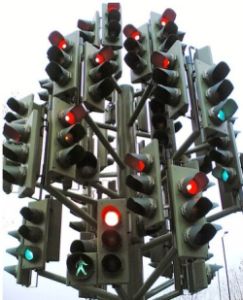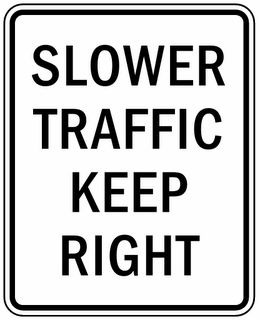 You’re driving along. You occupy an unyielding metal vehicle weighing a ton, more or less. You overtake a bicycle rider. You have a stripe of paint on the road to your left. You have a human being riding a bicycle on your right.
You’re driving along. You occupy an unyielding metal vehicle weighing a ton, more or less. You overtake a bicycle rider. You have a stripe of paint on the road to your left. You have a human being riding a bicycle on your right.
What kind of mind can’t decide which of these should be accorded the greater degree of inviolability? Whatever type it is, we seem to have lots of them among us. “I can’t cross that paint stripe! It’s a double yellow! I’ll just grit my teeth and take a chance with that human life over there!”
You’d think people could figure this out a little better, yet time after time this odd pattern evidences itself. Not only do we get obscure glimpses into the minds of single individuals this way, we also see how humanity tend to act when in “herd mode.” On the positive side, when one person in a line of traffic swings wide to give the bicyclist some room, the rest tend to follow along. This vice works versa, however, since the opposite pattern is just as likely to appear. One person deciding to “play chicken” with the bicycle rider will lead a string of drivers to engage in similar behavior. Apparently, we are only about as good as the people around us. Continue reading
 The translation here, 21st century style, is, “I know I did something to inconvenience you, but I don’t really want to have an unpleasant exchange with you, and I certainly don’t want to change my behavior in any way, either, so I am saying this meaningless thing I learned in
The translation here, 21st century style, is, “I know I did something to inconvenience you, but I don’t really want to have an unpleasant exchange with you, and I certainly don’t want to change my behavior in any way, either, so I am saying this meaningless thing I learned in  Speaking of that whole keep-up-with-the-traffic thing, one situation really screams out for it. Think of the last time you found yourself at the end of a long line of cars at a
Speaking of that whole keep-up-with-the-traffic thing, one situation really screams out for it. Think of the last time you found yourself at the end of a long line of cars at a  There is something that approximately one in five of you could do for the rest of us, something that seems quite easy, and why wouldn’t you want to do something easy that helped many other people? It really would entail no downside for you at all. It’s simply a matter of keeping up with traffic, if you could please. Or getting out of the way. Thanks so much.
There is something that approximately one in five of you could do for the rest of us, something that seems quite easy, and why wouldn’t you want to do something easy that helped many other people? It really would entail no downside for you at all. It’s simply a matter of keeping up with traffic, if you could please. Or getting out of the way. Thanks so much.
 It was bound to happen, and it did, early in the campaign so that measures could be taken. I refer, of course, to the calls from various entities that Barack Obama is “tryna ac’ white.” I don’t know exactly what the Obama campaign did to quell this particular complaint, but it seems to have gone away as quickly as it came.
It was bound to happen, and it did, early in the campaign so that measures could be taken. I refer, of course, to the calls from various entities that Barack Obama is “tryna ac’ white.” I don’t know exactly what the Obama campaign did to quell this particular complaint, but it seems to have gone away as quickly as it came. Boundaries and limits. Limits and boundaries. Life is full of these. Why would anyone try to raise a child without a proper grounding in these necessities? We can guess at some of the possible reasons, but people try to do it all the time. Really. All the time.
Boundaries and limits. Limits and boundaries. Life is full of these. Why would anyone try to raise a child without a proper grounding in these necessities? We can guess at some of the possible reasons, but people try to do it all the time. Really. All the time. I don’t know what got into me, exactly, but on a whim, I entered “I can haz” into a Google search. I guess I was becoming aware how often the phrase appears as I surf around. I wondered how pervasive it had become, how much cultural penetration it had achieved.
I don’t know what got into me, exactly, but on a whim, I entered “I can haz” into a Google search. I guess I was becoming aware how often the phrase appears as I surf around. I wondered how pervasive it had become, how much cultural penetration it had achieved.  With the
With the 